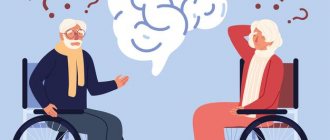Depression is a mental condition characterized by depressed mood, pessimism, lack of enjoyment of life and favorite activities, and difficulty remembering and concentrating.
According to the World Health Organization, the disorder affects more than 300 million people in the world. One of the main causes of the disorder is stress: negative events in life (breakup, loss of a job or valuable property, death of a loved one), long-term conflicts with relatives, colleagues, acquaintances. Women of any age are especially susceptible to such reactions.
Important
Our body can endure a lot. But if the negative impact of the environment exceeds its capabilities in strength or lasts too long, the body cannot withstand it, reserves are depleted - the person gets sick. Rest will not help here; treatment is necessary.
Stress is usually understood as a nonspecific protective reaction of the body, which is caused by the influence of physical (pain, cold, infection) or psychological factors (personal experiences, changes in the usual way of life). With prolonged exposure, the stress response loses its protective properties and begins to have a damaging effect on the body.
Due to a strong negative event (so-called psychotrauma) or chronic stress, psychogenic depression develops. It becomes difficult for a person to work and concentrate, he quickly gets tired, the world around him becomes gray, dull, joyless. Both your career and personal life suffer - the stress only increases. Therefore, it is important not only to diagnose in time, but also to know how to overcome stress and depression so as not to trigger the disease and not lead to hospitalization.
Manifestations of depression and stress
The main manifestations of stress are anxiety and restlessness. A person is constantly worried, often without adequate reason, “over trifles.” Easily fatigue, sleep disturbance (restless sleep, waking up early before the alarm, daytime drowsiness), irritability are added. It is not uncommon to experience panic attacks, which are characterized by sudden attacks of anxiety and fear.
Only an experienced psychotherapist can make an accurate diagnosis. It is important to determine the type of depression, because each option has its own treatment regimen.
The main symptoms of depression are the so-called depressive triad, which includes:
- low mood, depression, depression;
- mental retardation - lethargy, passivity, taciturnity, lack of emotions, loss of appetite, lack of initiative; thoughts around the same worries, often unfounded feelings of guilt, pessimism;
- motor retardation - severe weakness, a feeling of powerlessness, a person strives to take one position and may not move for days - for example, lying in bed, constantly looking at the ceiling. Some people, on the contrary, do not find a place for themselves - they walk around the room anxiously, wring their hands, and cry.
One of the symptoms that significantly reduces the quality of life of a patient with depression is sleep disturbance. It is characterized by the inability to fall asleep for a long time and short, superficial sleep that does not bring a feeling of rest. Insomnia, stress, depression are manifestations of mental illness and problems in the nervous system. Sleep disturbance should alert you and become a reason to consult a specialist.
Important
Sleep disturbances - insomnia, early awakening - these are often the first symptoms of incipient depression. It’s better to get treatment right away, because then it becomes more and more difficult to work, you don’t want to leave the house, thoughts of suicide come.
Symptoms of stress and depression are often subtle. A person may deny for a long time or not notice that stress is taking away more and more strength from him. Depression and fatigue, irritability and difficulty concentrating are perceived as the norm; a person does not remember that it used to be different. Rest and a change of environment, a diet rich in vitamins will only help along with the main treatment - psychotherapy and medication support.
Foods for Depression: Sources of Lost Vitamins and Microelements to Improve Mood
- Vitamin A - it is found in green and orange plant foods: lettuce, pumpkin, carrots. There is a lot of it in apricots.
- Vitamin C - look for it in lemons, oranges, limes and other citrus fruits, as well as black, red and white currants, cabbage, and rosehip infusion.
- B vitamins - found in seafood, avocados, liver, whole grain bread, nuts. These essential substances increase the content of PUFAs (polyunsaturated fatty acids). Pine nuts, beans, sardines, unrefined cereal grains are especially useful for depression - sources of B6 or pyridoxine, necessary for the synthesis of the happiness hormone - serotonin.
- Vitamin E - enters our body with vegetable oil, green leafy vegetables, almonds, apple seeds, and wheat germ.
- Magnesium - found in peas, grapefruits, pumpkin seeds, peanuts, beans, walnuts, wheat bran.
- Calcium is found mainly in dairy products, but also in mustard, pistachios, garlic, hazelnuts and almonds.
- Zinc – found in beef liver, cheese, eggs, legumes, plums, cabbage, carrots.
Food as an antidepressant
Back in 2021, Ramsey, along with Canadian psychiatrist Laura Lachance, reviewed more than 1,000 studies of successful nutritional interventions in the treatment and prevention of depressive disorders. In the first step, they identified 12 key nutrients that influence at least one of three factors in the development of depression: neuroplasticity, neuroinflammation and the microbiome. (Later, the list was slightly expanded.) On the second, they compiled a rating of products taking into account the content and bioavailability of these nutrients. The result is what Ramsey calls the Antidepressant Food Scale. Looks very difficult. But, according to the author, you don't need a calculator to put this knowledge into practice. To begin with, it is enough to simply replace food depressants with food antidepressants: trans fats with olive oil, red meat with fish and poultry, sugar and fatty desserts with fruits and berries.
Food antidepressant index: seafood, fish, liver, leafy greens, lettuce, peppers and cruciferous vegetables top the list
12+ Nutrients for the Brain
- Folic acid
Why: for the synthesis of myelin (the basis of the sheath of neuron processes) and neurotransmitters that regulate mood, feelings of pleasure and ensure clarity of thinking.
In what: chickpeas, peas, chicken liver, spinach, asparagus, Brussels sprouts.
- Iron
Why: to produce hemoglobin, which helps transport oxygen from the lungs to the brain, as well as for the synthesis of serotonin and dopamine.
In what: pumpkin seeds, oysters, spinach.
- Omega-3
Why: for neurogenesis (the formation of new nerve cells), counteracting inflammation and stimulating the production of BDNF.
In what: seafood, oily fish.
- Magnesium
Why: to grow synaptic connections and maintain communication between neurons.
In what: nuts, black beans, spinach, soy.
- Potassium
Why: to conduct electrical impulses through neurons.
In what: bananas, broccoli, sweet potatoes, white beans.
- Selenium
Why: for the synthesis of antioxidants and DNA reproduction.
In what: mushrooms, Brazil nuts, oatmeal.
- Thiamine (vitamin B1)
Why: to convert the main fuel (glucose) into energy.
In what: beef, nuts, legumes.
- Vitamin A
Why: for neuroplasticity, brain growth and adaptation.
In what: liver, mackerel, wild salmon.
- Vitamin B6
Why: for the production of tryptophan - an amino acid, without which the synthesis of serotonin is impossible; and also to suppress inflammation.
In what: whole grains, pork, eggs.
- Vitamin B12
Why: for the formation of myelin sheaths of nerve fibers and the synthesis of neurotransmitters (serotonin, norepinephrine and dopamine).
In what: shellfish, beef liver, mussels.
- Vitamin C
Why: to prevent damage caused by free radicals in brain cells; concentrated in the cerebrospinal fluid - cerebrospinal fluid, which ensures the maintenance of constant intracranial pressure and water-electrolyte homeostasis.
In what: berries, sweet peppers, cabbage.
- Zinc
Why: to maintain neuroplasticity and the generation of new neurons.
In what: pumpkin seeds, oysters, turkey.
- Monounsaturated fatty acids
Why: To fight inflammation and build myelin sheaths and cell membranes.
In what: olive oil, nuts, avocado.
- Kholin
Why: To produce phosphatidylcholine (a brain-building fat), regulate inflammation, and synthesize acetylcholine, an important neurotransmitter for learning and memory.
In what: eggs, cauliflower, lamb.
- Cellulose
Why: To support gut bacteria that help reduce inflammation and stress.
In what: leafy greens, legumes, whole grains.
How to get out of depression yourself - advice to a woman
According to statistics, women suffer from depression 2 times more often than men. This is due to greater emotionality and changing hormonal levels during the menstrual cycle. Due to the fact that women more often pay attention to their mental health, at the early stages of depressive disorder they are able to cope with it on their own.
6 rules for getting out of depression for a woman:
1. Positive emotions - they should be bright and strong. It’s better to put off ordinary hobbies or walks for now and try to organize an extreme event: flying in a wind tunnel, skydiving, go-karting, paintball and others. Such events give very vivid impressions and help you begin to appreciate life.
2. Physical activity - morning exercises or jogging does not take much time, but it promotes the production of neurotransmitters - “joy” hormones. Evening exercise improves sleep and relieves stress accumulated during the day. It is best to invite friends to play sports and ask them to join you. This will increase motivation, make you feel important and provide an opportunity to socialize once again.
3. Leisure – if your previous hobbies do not bring you pleasure, you should try to find new ones. It’s worth going to master classes, exhibitions, and trial classes.
4. Proper nutrition - the body spends a lot of energy digesting fatty foods, which is completely inappropriate for depression. It is better to eat light dishes, but varied. It is important not to overeat.
5. Daily routine and sleep - rest is very necessary for any illness, including depression. Getting up and going to bed at the same time, sleeping at least 8 hours a day will help cope with weakness and give the body a signal that everything is fine, predictable and safe.
6. Relaxation - every day it is recommended to devote at least 2 minutes to breathing practices and another 7 minutes of relaxation according to Jacobson. This will help calm the stress centers in the brain and relieve excessive anxiety.
These rules seem simple, but in fact, even for a healthy person, it is not so easy to follow them. Therefore, a depressed woman needs the support of loved ones, a sense of self-worth and maximum participation in her life. Then you can cope with the disease on your own. If the symptoms do not become weaker 2 weeks after starting to follow the rules, you should seek help from a specialist.
How to eat properly when depressed: what to eat if your nerves are exhausted
Not only external stimuli, but also our diet can lead to deterioration of the condition, causeless melancholy and sadness. Look at what you eat.
- Your menu should have enough fresh fruits and vegetables, legumes.
- Don't forget about whole grains, rice, lentils and other fiber-rich foods.
- Eat more fish, add flax seeds to cereals and desserts - these are important sources of polyunsaturated fatty acids that will help you cope with loss of energy and lack of mood.
We often remind you that dieting is stressful for the body. We will repeat this time, since most methods based on restrictions and prohibitions are also bad because they lead to a decrease in tryptophan consumption and a shortage of protein foods on the table. It is not surprising that such changes have a negative impact on the mental health of those losing weight.
Also, if you are depressed, it is recommended to avoid various stimulants:
- strong tea;
- coffee;
- energy drinks;
- cigarettes;
- sugar and sweets.
Taken together, all these components of an unhealthy diet can cause anxiety, sleep disturbances, and a sharp transition from joy to worry and sadness.
Foods that cause depression
If you want to prevent the development of apathy, outbursts of irritation and anger, you should avoid:
- alcoholic drinks and energy drinks, which are harmful to the functioning of the adrenal glands and provoke surges in blood sugar levels;
- Drinks with high caffeine content (tea and coffee) contribute to insomnia;
- Sweets and confectionery products affect blood sugar levels; excessive consumption of them leads to chronic fatigue syndrome.
Poor sleep, smoking, restrictive diets, and eating disorders that lead to prolonged feelings of hunger also harm your emotional state.
Tryptophan - an essential amino acid for happiness
An important nutrient for the functioning of the human nervous system is the amino acid tryptophan. The body does not synthesize it; we get all the amount of tryptophan we need from food.
Anti-depression foods high in tryptophan:
- Red caviar;
- horse mackerel;
- rabbit meat;
- turkey;
- veal;
- spinach;
- Pine nuts
- pistachios
- hard cheese
- milk
- Diso Nutrimoon








